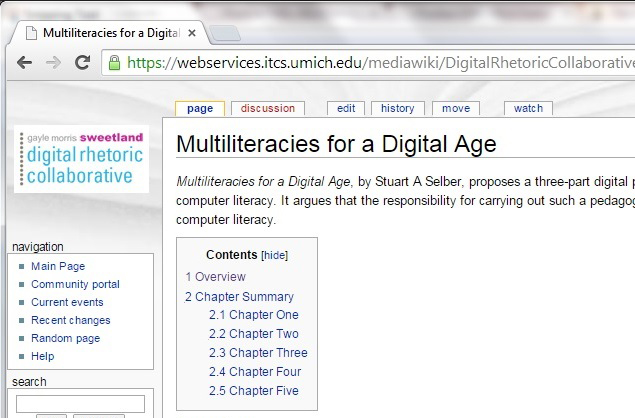Writing beyond the Classroom Context
Welcome back to Wiki Wednesday! Last week, we posted a DRC Wiki Call for Participation to Instructors, Students, and Scholars. This week, we want to spotlight a graduate student’s contribution, made re-using a class project. This is just one example of the many ways that instructors, students, and scholars can respond to the CFP.
In response to a DRC Wiki call for key Texts, DRC Fellow Emeritus Becca Tarsa created an entry for Stuart Selber’s Multiliteracies for a Digital Age. She contributed this content after seeing one of the texts listed in our key Texts/Books placeholders. To develop the entry, she modified material she’d created in response to a class assignment calling for a book review. Editing the wiki to add this material allowed Tarsa to take some of her coursework into a public venue beyond the classroom, and ultimately, to provide a scholarly resource for others to learn from and add to. One of the main features of a wiki is that editors can post material and gain an opportunity to collaboratively develop material together. This means that editors can choose how much of a contribution they have time and energy to make. Someone can always come along and develop your content!
We’ve got up a few placeholders for other key Books, but we call on you to contribute others, either adding placeholders or by creating full entries:
- Cybertext: Perspectives on Ergodic Literature
- Lingua Fracta
- Passions, Pedagogies, and 21st Century Technologies
- Remixing Composition
- Technologies of Wonder
- Writing Space: The Computer, Hypertext, and the History of Writing
Other major areas where we welcome contributions include:
- key People,
- key Threshold Concepts in Digital Rhetoric,
- key Histories,
- key Institutions,Organizations, and Conferences,
- key Texts (books, articles, journals, webtexts, websites),
- key Technologies and Software, and
- key Teaching Resources.

Ready to Get Registered and Start Editing? We look forward to seeing your contributions soon!

